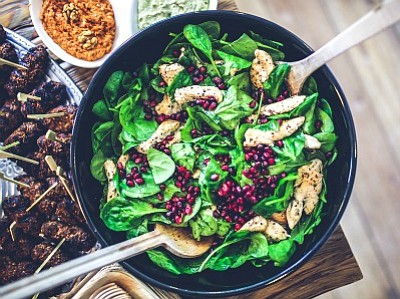(CNN) — AS Monaco has been the surprise package of Europe this season, blowing away its rivals to reach the Champions League semifinals and sitting on the brink of a first Ligue 1 title in 17 years.
But behind the training sessions, detailed scouting reports and in-depth tactical analysis, there’s something going on in the kitchen that’s designed to help Monaco get the better of its opponents.
Monaco’s doctor Philippe Kuentz, nutritionist Juan Morillas and team dietitian Tara Ostrowe are tasked with choosing the right foods at the right time to help maximize the physical potential of each footballer at the club.
And below Ostrowe names the eight foods she gives to her players, so you too can eat like a pro.
Quinoa
In recent years, quinoa has become a must eat grain for foodies. But far from just making you look cool, it also has plenty of benefits.
“It’s a very powerful wholegrain and the main fuel for the players’ performance,” Ostrowe tells CNN.
“It’s also packed with lots of vitamins, nutrients and protein, which will also sustain the energy throughout the game.”
Benefits in brief
• Excellent fuel source
• Good source of folate, thiamin and iron
• 16% of daily value of protein in one serving
Kale
While just the thought of a kale smoothie is enough to make most people shudder, this green has become popular among chefs and in households for its versatility, taste and wide range of physical benefits.
“This is what I consider the superfood vegetable,” Ostrowe explains.
“It’s packed with lots of vitamin C, calcium and vitamin K, all of which are perfect for recovery and providing good nutrition.”
Benefits in brief
• Great source of vitamin A, C and K
• Good source of calcium and manganese
• Excellent for workout recovery
Beetroot juice
It may be one of the less well-known health foods on Ostrowe’s list, but beetroot and beetroot juice are incredibly beneficial to those participating in cardiovascular exercise.
“We try to give it to the players before a match, and for a few days before — it builds up to help with oxygen capacity,” Ostrowe says. “It’s also packed with lots of vitamins and antioxidants.”
Benefits in brief
• Very effective at increasing oxygen capacity for exercise
• Improves blood flow and circulation
• Contains anti-inflammatory factors
Chia seeds
Good things come in small packages, as they say, and that is certainly the case for chia seeds.
They may be tiny but these seeds pack a mighty amount of health benefits and can be used on anything from cereal to salad.
“As you can see, they’re very small but they pack lots of good nutrition,” Ostrowe says. “The players will put that on all their food. We have it at every meal.
“They put it on their breakfast and it helps with energy for training. Then we also have it for lunch and at dinner, which helps with bringing down inflammation.”
Benefits in brief
• Incredible source of omega-3 fatty acids
• Contain 42% of daily value of fiber in one serving
• Rich source of protein and calcium
Salmon
Your parents’ claims that fish would help you in your school exams in an attempt to convince you to finish your dinner are not without foundation.
Nutritionists often refer to fish — but salmon in particular — as a brain food thanks to its high omega-3 content, It is believed to promote brain function, hence the recommendation to eat it the day before an exam.
“Salmon is a really great, lean protein,” she says.
“It’s a really good type of fish to have as a post-recovery meal, so we’ll often have it after a big match — especially if we have another match in a few days from now, it’ll help bring down inflammation, help with muscle recovery and help with tissue regrowth.”
Benefits in brief
• Excellent source of protein (87% of daily value in one serving)
• Great source for several vitamins (E, niacin and B12)
• Helps bring down inflammation
Tart cherry juice
Having trouble sleeping at night? Then try drinking tart cherry juice.
“It has very strong anti-arthritic properties,” Ostrowe explains. “So it helps with soreness, inflammation and sleep.”
Benefits in brief
• Strong anti-arthritic properties
• Contains lots of antioxidants
• Helps with sleep issues and physical recovery
Avocado
So popular has this fruit become in recent years, the avocado fad has been deemed ‘overcado’ for quite some time.
But, not to worry, if you’re more into the healthy benefits of food than adhering to the latest fashion trends, then the avocado is still for you.
“Avocado is another superfood,” says Ostrowe. “It’s filled with vitamin E.
“It’s high in fat and that healthy fat is a precursor for testosterone, which helps with muscle rebuilding, muscle growth and getting stronger.”
Benefits in brief
• Contains at least 20% of daily value of six different vitamins and minerals
• Loaded with omega-6 healthy fats (over 2500mg per serving)
• Has 40% daily value of fiber per serving
Blueberries
It may often be referred to as “the grandad of superfoods,” but the humble blueberry has certainly kept up with the times.
Few foods provide more antioxidants and for this reason it is often recommended as a must-have by nutritionists in most diets.
“As kale is the superfood vegetable, these are the superfood fruits,” Ostrowe says. “Blueberries are packed with antioxidants, they actually have the highest antioxidant content of any fruit.
“It’s a carbohydrate source so it will be good for fueling the workout and it doesn’t spike insulin levels, so it’s a great pre-match snack to have. And quite delicious as well!”
Benefits in brief
• Highest antioxidant content of any fruit
• Good source of dietary fiber (14% of your daily value in one serving)
• High content of vitamin C helps recovery post-workout
